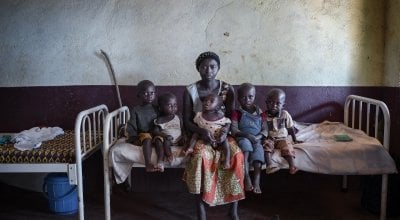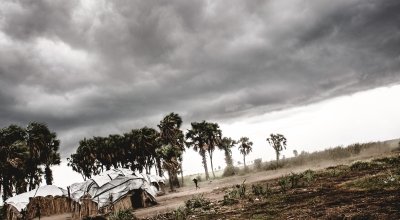
Knowledge Hub
Conversations with the experts on climate change and hunger

To mark World Food Day this year, Concern put a spotlight on one of the biggest drivers of food insecurity and hunger - climate change.
With global temperatures rising, climate related shocks becoming ever more frequent and the world’s population set to reach 10 billion by 2050, it has never been more important to galvanise action.
On 17 October, Concern hosted an event with leading experts in nutrition and climate change discussing how we can nourish the world’s poorest people while protecting the planet.
To discuss this topic, we were joined by Clare Shakya (International Institute for Environment and Development), Alan Dangour (London School of Hygiene and Tropical Medicine), Jason Hickel (author and anthropologist) and Amina Abdulla (Concern Kenya Director) on the panel. Guardian environment journalist, Fiona Harvey, chaired the event.
Underpinning the discussion were new figures published in the Global Hunger Index (GHI), produced yearly by Concern and Welthungerhilfe, which revealed worrying trends. While there has been a slight improvement in global hunger levels since the 2018 report (a GHI score of 20.0 instead of 20.9), the total number of people going hungry has increased and now stands at 822 million.
Many countries are seeing higher levels of hunger now than in 2010, driven primarily by conflict and climate change.
- Hunger levels in the Central African Republic are at an extremely alarming level.
- Chad, Madagascar, Yemen, and Zambia are seeing alarming levels of hunger.
- A further 43 countries report serious levels of hunger.
- There are 9 countries where measurement is not possible but which may be experiencing significant levels of hunger. These countries include Burundi, Democratic Republic of Congo, Syria, South Sudan, Somalia.
But within countries too, there can be significant disparity. Amina Abdulla, Concern Country Director for Kenya, highlighted how climate change is affecting food security for people in Northern Kenya:
Kenya has the highest level of inequality in Africa. In the North of Kenya, where there are already high levels of poverty, we’re seeing droughts much more frequently. People don’t have time to rebuild their assets before the next drought comes. The effects of climate change deepen levels of poverty. They deepen levels of hunger.”
Amina also highlighted how solutions can be found by drawing from local knowledge:
We need to start at the local level, working with people to come up with solutions and then investing in the projects that people have prioritised.





Jason Hickel, however, challenged the international community to do more and stressed that the real problem lies in our political and economic system, saying:
What we are dealing with here is a structural problem. It is ultimately a political challenge.
He reminded us that attempts to address hunger are not new: “We’ve been fighting this battle against hunger for 50 years.” A fact, he suggested, was a profound indictment of economic growth and that the system at present means that “the flow of wealth is trickle up.” He argued that what was needed was “to abandon the paradigm of charity and move to the paradigm of justice.”
Alan Dangour talked about how we also need to move beyond hunger and talk about nutrition, saying that:
The focus is still on whether we can produce enough calories, particularly through cereals.
He added that this is not enough to address malnutrition: “we need to look at the entire basket of foods needed for a healthy diet.” This he felt was largely missing from the global discussions and funder landscape.
Clare Shakya highlighted how 2020 provided key opportunities for linking hunger and climate change, the need to address power, and a call to action for the audience:
Fundamentally it’s about power. What’s exciting is the least developed countries have been saying this for some time.
She continued: “They’re saying that 70% of any finance coming to them to be aimed at communities. Getting as much decision-making down to the local level as possible.
“The only way to really change the narrative is strong demand. Every single person here lobbying. The only way to get institutional change in the face of massive inertia is through massive pressure.”
Concern will continue to press for greater international investment in nutrition and building community resilience and adaptation to climate shocks.
This investment must prioritise the most vulnerable groups and regions and facilitate public participation in decision making, particularly for women. Early warning, early actions systems must be scaled up and properly resourced with fast and flexible funding. Recognising that many areas vulnerable to climatic shocks are also in fragile states, a conflict sensitive approach must be taken.
To be effective, this must all sit within the context of addressing extreme poverty and inequality through investment in health, education and social protection. Land rights and regulatory frameworks will be increasingly important as competition for natural resources grows.
Lastly, more ambitious action must be taken to mitigate climate change, without compromising food and nutrition security. Countries must therefore harmonise climate policy with food and trade policies.
Concern will also look internally, at how we deliver our programmes and run our offices, to ensure we are pushing for the best environmental policies and practices.





